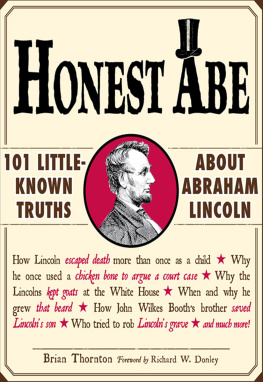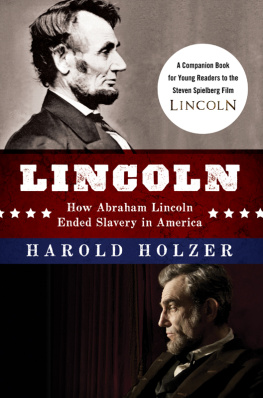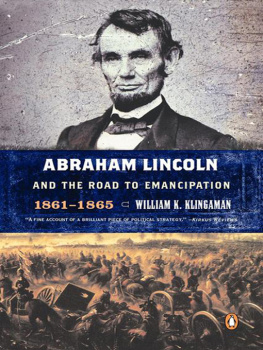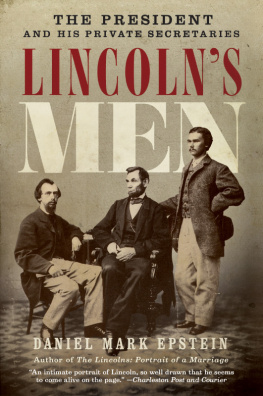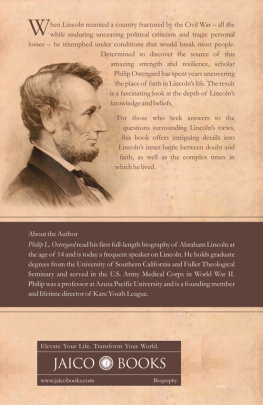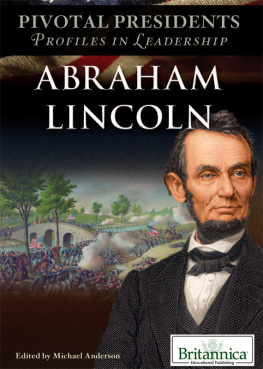Harcourt, Inc.
Orlando Austin New York San Diego London
Copyright 2007 by John C. Waugh
All rights reserved. No part of this publication may be reproduced or transmitted in
any form or by any means, electronic or mechanical, including photocopy, recording,
or any information storage and retrieval system, without permission in writing from
the publisher.
Requests for permission to make copies of any part of the work should be submitted
online at www.harcourt.com/contact or mailed to the following address: Permissions
Department, Harcourt, Inc., 6277 Sea Harbor Drive, Orlando, Florida 32887-6777.
www.HarcourtBooks.com
Library of Congress Cataloging-in-Publication Data
Waugh, John C.
One man great enough : Abraham Lincoln's road to
Civil War / John C. Waugh.1st ed.
p. cm.
Includes bibliographical references and index.
1. Lincoln, Abraham, 18091865Childhood and youth. 2. Lincoln, Abraham,
18091865Political career before 1861. 3. Lincoln, Abraham, 18091865
Political and social views. 4. PresidentsUnited StatesBiography. 5. United
StatesPolitics and government18371841. 6. United StatesPolitics and
government18411845. 7. United StatesPolitics and government18451861.
8. United StatesHistory-Civil War, 18611865Causes. 9. IllinoisPolitics and
governmentTo 1865. I. Title.
E457.3.W25 2007
973.7092dc22 2007009588
978-0-15-101071-4
Text set in Simoncini Garamond
Designed by Lydia D'moch
Printed in the United States of America
First edition
C E G I K J H F D B
For my father,
who had a sense of humor
Lincoln would have appreciated.
CONTENTS
Prologue The Uncoiling of the Serpent 1
P ART O NE W HO H E W AS AND W HERE H E C AME F ROM 5
Chapter 1 The Dark and Bloody Ground 7
Chapter 2 The Hoosier Years 11
P ART T WO M AKING H IS W AY 21
Chapter 3 New Salem 23
Chapter 4 Politics 33
Chapter 5 Vandalia 39
P ART T HREE T HE I SSUE'S D ARK S IDE 47
Chapter 6 Death in Alton 49
P ART F OUR P OLITICAL E NEMIES AND F EMALE E NIGMAS 61
Chapter 7 Springfield 63
Chapter 8 Young Hickory 73
Chapter 9 The Ballyhoo Campaign 85
Chapter 10 Lincoln in Love 105
P ART F IVE O N THE N ATIONAL S TAGE 117
Chapter 11 The Steam Engine in Breeches and the Engine that Knew No Rest 119
Chapter 12 "Who Is James K. Polk?" 129
Chapter 13 Laying Congressional Pipe 143
Chapter 14 Seeing Spots 153
P ART S IX E CLIPSE 165
Chapter 15 Lincoln's Other Life 167
Chapter 16 What He Had Become 183
Chapter 17 Tempest 193
P ART S EVEN C LASH OF THE G IANTS 201
Chapter 18 Lincoln Emerges 203
Chapter 19 Political Earthquake 221
Chapter 20 At the Crossroads 233
Chapter 21 Axe Handles and Wedges 239
Chapter 22 A House Divided 249
Chapter 23 The Debates 265
P ART E IGHT O N THE G LORY R OAD 285
Chapter 24 Spreading the Gospel 287
Chapter 25 Cooper Union 295
Chapter 26 Reaching for the Brass Ring 309
Chapter 27 Chicago 319
P ART N INE F ROM B ALLOTS TO B ULLETS 339
Chapter 28 The Four Legged Race 341
Chapter 29 Firebell in the Night 359
Chapter 30 Getting There 377
Chapter 31 The War Comes 397
Epilogue Twilight of the Little Giant 413
In Appreciation 419
Notes 422
Sources Cited 455
Index 464
PROLOGUE
The Uncoiling of the Serpent
The new two-story statehouse in Vandalia, Illinois, stood unfinished in early 1837. Workmen had slapped plaster on the walls just before the Tenth General Assembly convened in December. Its damp, displeasing essence still hung in the legislative chambers upstairs.
Abraham Lincoln, a young Whig legislator from Sangamon County, was beginning his second term. He was not as new to politics as the plaster was to the walls, but the plaster was more likely to stick than what he was about to do. In a bold move, he was about to drop a resolution into the record that ran emphatically against dominant public opinion in his stateon slavery, which raised hackles as no other issue did.
The issue was uncoiling across the country like a hissing serpent. Abolition societies proliferated in the North, blanketing the Union with incendiary antislavery pamphlets. Alarmed and angry Southern legislators were passing resolutions violently condemning these "fire brands of discord and disunion." The South's mightiest guns, its most articulate and powerful ideologues, were answering in kind, showering shot and shell on abolitionism in the defense of their "peculiar institution."
Southern legislatures were not only passing angry resolutions against abolitionists, they were demanding that Northern legislatures do the same. Virginia, Alabama, and Mississippi had sent memorials to Illinois, which Governor Joseph Duncan had transmitted to the General Assembly in December 1836.
In January, the Illinois legislature resoundingly passed a set of sympathizing resolutionsthat "we highly disapprove of the formation of abolition societies, and of the doctrines promulgated by them"; that the right of property in slaves is "sacred to the slave-holding States by the Federal Constitution, and that they can't be deprived of that right without their consent."
Lincoln quietly voted against the resolutions, one of only six of the legislature's ninety-one members who did. In early March, three days before adjournment, he wanted to quietly add something more to the record.
The issue was important to many in Illinois, but it mattered to Lincoln in a different way. For the most part, the people of Illinois were emigrants from Southern states, as was Lincoln himselfborn in Kentucky and grown to manhood in southern Indiana. Most of these former Southerners were for slavery and against anything that wasn't.
Lincoln, though a Southerner, didn't see it exactly that way. Not that this gangly young lawmaker bought into the idea of Negro equality. He didn't. With most white opinion, Northern and Southern, he embraced white supremacy. He opposed black suffrage, voting in his first term for a resolution "that the elective franchise should be kept pure from contamination by the admission of colored votes." He rejected outright the idea of racial intermarriage.
But in Lincoln's mind slavery was a different matter. It was immoral, crowding the outer limit of inhumanity. He was to say, "I am naturally anti-slavery. If slavery is not wrong, nothing is wrong. I can not remember when I did not so think, and feel."
In March 1837, he wanted to introduce a resolution that would mirror this feeling. But he was playing with dynamite. The wording had to be hedged; it would be political suicide in Illinois to be lumped with abolitionists. And he would have to do it virtually alone. The only other House member willing to go with him was Dan Stone, a fellow Whig legislator who had brought his anti-slavery psyche with him from his native Vermont.
On March 3 they introduced their resolution, protesting the longer ones passed in January. It was entered in the record without comment or debate. It said: "Resolutions upon the subject of domestic slavery having passed both branches of the General Assembly at its present session, the undersigned hereby protest against the passage of the same. They believe that the institution of slavery is founded on both injustice and bad policy; but that the promulgation of abolition doctrines tends rather to increase than to abate its evils."
Next page

